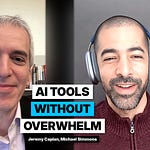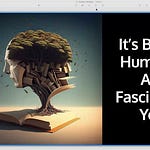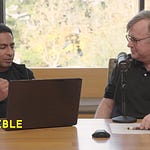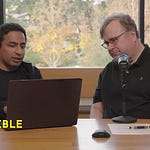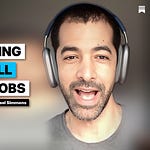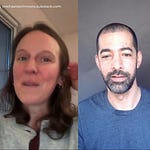Video clip source: No Priors Podcast with NVIDIA CEO Jensen Huang (November 2024)
In 1997, chess grandmaster Garry Kasparov saw something that made him question everything he knew about human intelligence. Playing against IBM's Deep Blue, he encountered a move that no human in history had ever played. A move that broke every chess "best practice" developed over 500 years. Not because it was brilliant. But because it was impossible for any human to find. It broke free from chess "best practices" through brute-force exploration of possibilities.
Reflecting on the experience, Kasparov said:
“For the first time in the history of mankind, I saw something similar to an artificial intellect.”
25 years later, Jensen Huang, founder and CEO of NVIDIA, the largest company in the world, just revealed something far more unsettling: This same phenomenon isn't just changing games anymore—it's transforming how NVIDIA solves its most fundamental problems.
In the interview above, Huang reveals how AI engineers achieved what experts considered impossible: a 5x improvement in chip performance in just one year.
"They could explore a much larger space than we can... because they have infinite time. They're running on a supercomputer."
—Jensen Huang
He also revealed that the leap was "impossible using traditional approaches" and was based on AI’s ability to explore vastly larger solution spaces—the same method that Deep Blue used to defeat Gary Kasparov.
Kasparov and Huang aren’t alone.
In 2018, I spent 100+ hours researching how leading companies create “experimentation engines” to test thousands of possibilities. Then, I wrote Forget The 10,000-Hour Rule; Edison, Bezos, & Zuckerberg Follow The 10,000-Experiment Rule, which was read hundreds of thousands of times. One interview clip between Sam Altman and Mark Zuckerberg still stands out:
This quote is key:
“At any given point in time, there's not just one version of Facebook running in the world. There's probably tens of thousands of versions running because engineers here have the power to to try out an idea and ship it to, maybe 10,000 people or a 100,000 people.”
Similar to Deep Blue exploring thousands of potential moves and NVIDIA exploring the solution space of all chip designs, it’s like Mark Zuckerberg is branching quantum reality into tens of thousands of possibilities and keeping the versions he likes.
And the list goes on…
Google’s AlphaGo famously defeated the world’s top go player using a probabilistic brute-force technique that searches a vast tree of potential moves.
Google’s AlphaFold used an iterative search approach to evaluate billions of potential protein folds for accuracy and stability. Demis Hassabbis at Google received a Chemistry Nobel Prize as a result.
So, what’s special about this moment isn’t proving that this technique works. It does.
What’s special about this moment is that the technology to think about and solve problems this way is being democratized to all knowledge workers.
The implication here is that AI’s ability to explore vast solution space will change how we solve every professional problem. And it's about to make most of what we consider "expertise" obsolete.
Let’s break down how knowledge work is about to change forever
Think about the last major decision you made at work:
Which strategy to pursue
How to structure your team
What product to build
No matter how thorough you were, you were forced to:
Consider only a handful of options
Rely heavily on past experience
Make assumptions to simplify the problem
Choose a direction before exploring all possibilities
This isn't because you weren't being thorough.
It's because your brain has fundamental constraints that have limited every decision ever made in human history.
Until now.
What Huang revealed isn't just about building better chips. It's about transcending the core limitations that have defined human intelligence since our species began:
"[AI] could explore a much larger space than we can... because they have infinite time. They're running on a supercomputer."
Read that again.
Infinite exploration time.
Imagine what this means for your career when you can leverage AI to:
Test every possible way to structure that career-defining presentation
Explore every potential strategy for your company's five-year plan
Simulate how different approaches would affect your team
Find hidden opportunities in massive datasets
Test thousands of product variations before launching
This isn't just speculation.
It's what AI is already enabling. And almost no one outside of the world's top AI labs really understands what this means for human intelligence.
Think of it like the difference between walking through a maze in the dark with a flashlight and seeing the entire maze from above in broad daylight.
The implications of expanding our limited ability to explore possibilities will transform every aspect of professional life:
How we solve complex problems
What we consider possible
What challenges we dare to tackle
Understanding these implications early could be the difference between:
Being the executive who sees opportunities others miss and consistently makes better strategic decisions
Being the entrepreneur who tests thousands of ideas and finds the perfect market opportunity while others are still brainstorming
Being the professional who consistently achieves "impossible" results and gets promoted while peers wonder how you do it
Or being left behind, wondering how others are achieving things you thought impossible.
Below are the five profound implications of expanded exploration that will reshape how ambitious professionals solve problems in the AI age:
The Most Dangerous Phrase in Business Just Changed
Why "20 Years of Experience" Might Be Your Biggest Weakness
The Death of Trade-Offs: When Everything Can Be Optimized Simultaneously
The Rise of Complete Systems: When Everything Is Connected to Everything
The Great Professional Identity Shift: From Knower to Explorer
Free subscribers get access to the first two implications.
Paid subscribers get:
Access to all five implications
The 10-Minute Possibility Expander (A powerful framework + AI prompt system that helps you apply the article in minutes and get immediate results)
The 10-Minute Possibility Expander (Paid Subscriber Bonus)
Want to instantly see breakthrough possibilities others miss using the insights from this article?
The 10-Minute Possibility Expander helps you
→ See 10x more possibilities in any situation
→ Break free from assumed constraints
→ Turn AI into your personal possibility explorer
This isn't just another framework. It's a simple, repeatable process that combines:
→ A possibility expansion framework
→ Carefully engineered AI prompts
You can immediately use these in your next:
→ Strategic decision
→ Product innovation
→ Business model shift
→ Career moveLet's dive in...
1. The Most Dangerous Phrase in Business Just Changed
"Let's be realistic about what's possible."
For decades, this was considered wisdom. The mark of a seasoned professional. The voice of experience.
In 2025, it's becoming a career extinction event.
Here's why with a hypothetical example:
A group of product managers at a Fortune 500 company recently faced a seemingly impossible challenge:
Their CEO wanted a new product line that would:
Cost 50% less to produce
Deliver 2x more features
Launch in half the usual time
"Let's be realistic," they said in the planning meeting. "We can maybe hit one of those goals. Two if we're lucky. But all three? Impossible."
They were using decades of experience to be "realistic."
And they were completely wrong.
The Reality Trap
Think about the last time you were in a planning meeting.
Someone probably said something like:
"Let's focus on what's actually achievable"
"We need to be practical about this"
"Let's set realistic goals"
These statements used to be hallmarks of good judgment.
Now they're red flags that signal imminent disruption.
The Hidden Danger of "Being Realistic"
Here's what "being realistic" really means in 2025:
You're Using Human Limitations to Define Reality
When you say "realistic," you mean "realistic for humans to explore manually"
When you say "practical," you mean "practical given human cognitive limits"
When you say "achievable," you mean "achievable using traditional methods"
You're Making Decisions Based on Artificial Constraints
Your deadlines are based on human exploration speed
Your options are limited by human analysis capacity
Your goals are capped by human prediction ability
You're Inviting Disruption
While you're "being realistic"
Your competitors are redefining possible
Your industry is transforming
Your career trajectory is being capped
The Great Reality Expansion
Remember that "impossible" product development challenge?
Here's what actually happened when they used AI-enabled exploration:
Traditional Approach (Human Reality)
Explored 10-15 design variations
Tested with small focus groups
Made educated guesses about manufacturing
Result: Could achieve 1-2 goals maximum
AI-Enabled Approach (Actual Reality)
Explored 50,000 design variations
Simulated millions of user interactions
Optimized entire manufacturing process
Result: Achieved all three "impossible" goals
The difference wasn't better execution. It was expanded reality.
The Three Reality Blindnesses
Scale Blindness
You think exploring 100 options is thorough
While competitors explore 100,000
Speed Blindness
You think monthly iterations are fast
While competitors iterate every hour
Possibility Blindness
You think 10% improvement is ambitious
While competitors achieve 10x
The New Reality Map
The future belongs to what I call "Reality Expanders" who:
Start with Impossible Goals
Old Think: "What's realistic to achieve?"
New Think: "What would be amazing to achieve?"
Remove Human Constraints
Old Think: "What can we explore manually?"
New Think: "What could we explore with AI?"
Reset Success Metrics
Old Think: "What's a good improvement?"
New Think: "What's a transformative improvement?"
Second-Order Effect: The Rise of "Exploration Architects"
This creates an entirely new type of expertise that combines deep domain knowledge with expansive exploration capabilities:
Defining Search Spaces
What variables matter?
How do they interact?
What constraints are real vs. assumed?
Setting Search Parameters
What defines an optimal outcome?
How do we weigh different factors?
What secondary effects matter?
Interpreting Results
How do we understand non-obvious solutions?
What patterns emerge across possibilities?
How do we implement counter-intuitive findings?
The key, for now, is not to abandon human expertise but to augment it with unprecedented exploratory power. The best exploration architects will combine:
Deep domain knowledge that helps frame the right questions
Systematic exploration that challenges assumptions
Pattern recognition that connects novel findings to practical applications
Key Takeaway
The key insight is that we're moving from a world where success comes from making good decisions within constraints to one where it comes from asking the right questions and defining the right spaces to explore.
The winners won't be those who know the most answers—they'll be those who know how to explore possibilities most effectively.
2. Why "20 Years of Experience" Might Be Your Biggest Weakness
In 1898, a consultant with no experience in shoveling walked into Bethlehem Steel and shared a belief that seemed absurd:
"Your 600 workers are using shovels wrong. I can show them how to do it much better. We've been using shovels wrong for 7,000 years."
I can imagine the managers laughing.
After all, how could someone challenge a practice as fundamental as shoveling? What could possibly be left to discover about moving dirt from point A to point B?
Three months later, those same managers watched in disbelief as:
Worker output doubled
Workers earned 35% more
Company costs dropped significantly
All because Frederick Taylor questioned assumptions that experts had accepted for thousands of years.
Now here's the uncomfortable part:
If experts could be that wrong about something as simple as shoveling...
What are you wrong about in your complex knowledge work?
The Experience Trap
Think about how we've always viewed professional growth:
Learn the fundamentals
Master best practices
Build on experience
Become an expert
Seems logical, right?
But there's a hidden flaw so fundamental that almost no one sees it:
Every "best practice" you've learned is just a local maximum that humans settled for because they couldn't explore further.
In this way, NVIDIA’s chip design breakthrough is similar to Taylor’s shoveling breakthrough. The innovation came not from having more expertise, but from being free from the limitations of human expertise. In the clip above, Huang tellingly says:
"We couldn't have built Hopper without it. And the reason for that is because they could explore a much larger space than we can."
Traditional chip designers would:
Follow established design principles
Build on proven architectures
Rely on known optimizations
The result? Incremental improvements.
But when AI explored without these constraints, it:
Found novel architectures humans never considered
Combined elements in unexpected ways
Optimized for factors experts thought impossible to combine
The result? A 5x improvement that shattered expert expectations.
The Great Unlearning
Consider these real-world examples of how "best practices" limit us:
In Management:
"Span of control should be 7-10 direct reports"
"Performance reviews should be annual"
"Remote work reduces collaboration"
"Hierarchical structures are necessary at scale"
In Business Strategy:
"Focus on one core competency"
"Stick to your industry"
"Build competitive moats"
"Find sustainable advantages"
These aren't universal truths—they're just the best solutions humans could find within their limited ability to explore possibilities.
In an AI-enabled world, experience can become a liability when it:
Makes us dismiss viable options
Blinds us to new possibilities
Keeps us stuck in old patterns
Prevents us from considering "impossible" solutions
Second-Order Effect: The Rise of "Best Practice Architects"
This creates a new type of professional who:
Questions Everything
Identifies hidden assumptions in best practices
Asks "why" about standard approaches
Challenges accepted wisdom
Looks for evidence rather than precedent
Designs Experiments
Tests traditional assumptions
Measures actual vs. assumed outcomes
Creates controlled trials of new approaches
Validates or invalidates accepted wisdom
Creates New Practices
Develops evidence-based approaches
Builds flexible frameworks
Designs adaptive systems
Focuses on principles over practices
Third-Order Effect: The Death of "That's How It's Done"
This transforms how organizations operate:
Traditional Approach:
Follow industry standards
Copy successful competitors
Implement proven practices
Scale what works
New Approach:
Question industry standards
Ignore competitor approaches
Test assumed practices
Scale what's proven
The Career-Defining Question
This creates an uncomfortable truth:
Your years of experience are either your greatest asset or your greatest liability.
The difference comes down to one question:
Are you using your experience to:
Quickly jump to "proven" solutions?
Or design better experiments?
The 2-Minute Expertise Reset
Before your next major decision, ask:
The Assumption Question: "What if even my most basic assumptions are wrong?"
The Exploration Question: "How could we test 100x more possibilities?"
The Humility Question: "What if the best solution is something no expert would consider?"
The Ultimate Paradox
Here's the mind-bending reality of expertise in 2025:
The most valuable kind of experience is the kind that teaches you how to think like you have no experience.
Because in the age of AI-enabled exploration:
Being "experienced" can be dangerous
Being "proven" can be limiting
Being "expert" can be blinding
But being able to question everything while exploring anything?
That's the new superpower.
In 2025, the most dangerous expertise may not be the knowledge you lack.
It may be the knowledge you think you have, but don’t.





